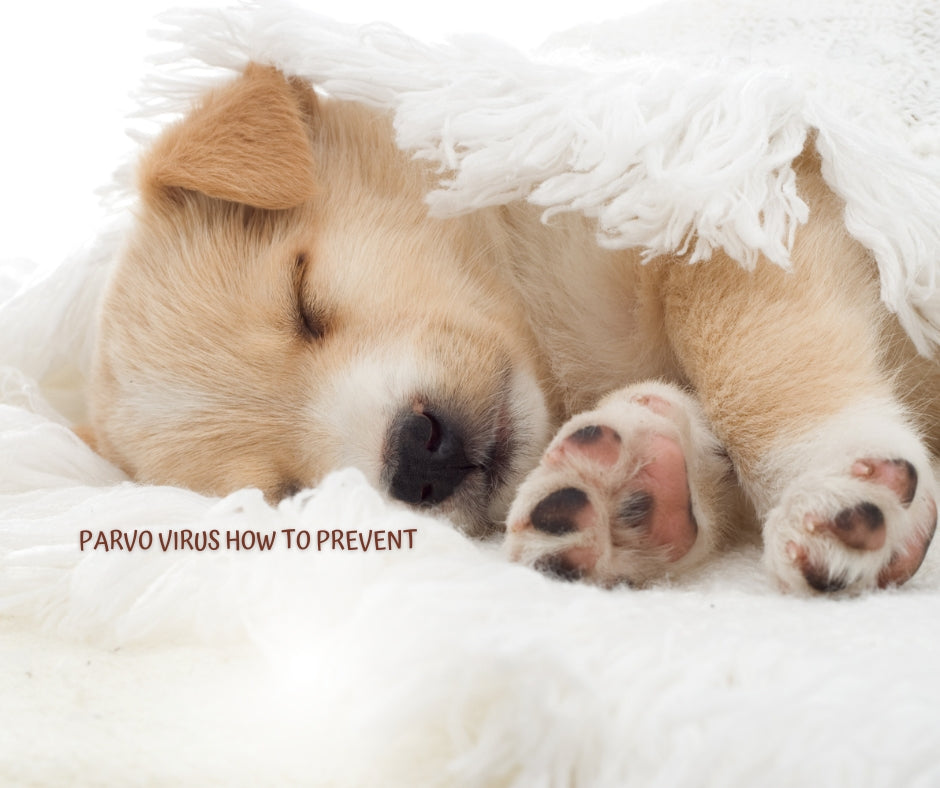
The Most Deadly Dog Disease: Parvo
Share
How to Protect Your Dog and Keep Them Healthy
Parvovirus, commonly known as "parvo," is one of the most serious and potentially fatal diseases that can affect dogs, especially puppies. As a responsible dog owner, understanding how parvo spreads, the symptoms to watch for, and how to prevent and treat it can make a huge difference in the health and safety of your furry companion.
What is Parvo?
Parvo is a highly contagious viral infection that primarily attacks the gastrointestinal tract of dogs, but it can also damage the heart muscle, especially in very young puppies. The virus is notorious for spreading quickly and can be fatal if not treated promptly.
How Does Parvo Spread?
Parvo spreads through direct contact with an infected dog’s feces, or through contaminated environments like dog parks, vet clinics, or even on shared toys and leashes. The virus is incredibly resilient and can live on surfaces for months, making it easy for dogs to contract it even if they’ve never been in direct contact with an infected animal.
Dogs can also catch parvo by licking contaminated areas or sniffing infected feces. So, even seemingly harmless outdoor spaces can be risky if they’ve been exposed to the virus.
Symptoms of Parvo: What to Look For
Parvovirus can develop very quickly, and early detection is crucial for successful treatment. Symptoms usually appear within 3 to 7 days after exposure and include:
- Severe vomiting
- Profuse, bloody diarrhea
- Loss of appetite
- Lethargy or depression
- Dehydration (due to vomiting and diarrhea)
- Fever or low body temperature
If your dog exhibits any of these symptoms, it’s vital to seek veterinary care immediately. Parvo can cause rapid dehydration, which can lead to shock and even organ failure without timely treatment.
Treatment: Can Parvo Be Cured?
While there is no specific "cure" for parvovirus, the good news is that with intensive care and early intervention, many dogs can survive parvo. Treatment typically involves supportive care such as:
- Intravenous fluids to combat dehydration
- Anti-nausea medications to help control vomiting
- Antibiotics to prevent secondary bacterial infections
- Pain management to keep your dog comfortable
- Blood transfusions in severe cases of anemia
Recovery from parvo can take a week or more, and it often requires a stay at the veterinary clinic for constant monitoring. However, with proper treatment, many dogs bounce back and recover fully.
Preventing Parvo: Vaccination is Key
The most effective way to prevent parvo is through vaccination. Puppies typically receive a series of vaccinations starting at 6 to 8 weeks of age, with booster shots every 3-4 weeks until they’re about 16 weeks old. After that, adult dogs need regular booster shots to maintain immunity.
Here are a few steps to help protect your dog:
- Vaccinate your dog on schedule – This is the best defense against parvo. Be sure your dog gets their puppy shots and continues with their adult vaccinations. If you adopt a dog or get one from a shelter, ask about their vaccination history and make sure they’re up-to-date.
- Practice good hygiene – Clean and disinfect your dog's environment regularly, especially if you’ve been around other dogs. Use a disinfectant that is effective against parvovirus, like bleach diluted with water (1:30 ratio). Parvo is incredibly hardy, so thorough cleaning is essential.
- Avoid high-risk areas – If you have a puppy who has not yet completed their vaccination series, avoid public spaces like dog parks, pet stores, or places where other dogs frequent. This will help minimize their exposure to the virus.
- Limit contact with infected dogs – If you know a dog that is showing symptoms of parvo or has been diagnosed, keep your dog away from them. Make sure to avoid areas where infected dogs have been, as the virus can linger for weeks.
- Keep your dog healthy – A strong immune system is vital for fighting off infections. Feed your dog a balanced diet, exercise them regularly, and ensure they receive regular veterinary check-ups to keep their health in top shape.
Parvo Myths: Separating Fact from Fiction
There are a lot of myths surrounding parvo, so let’s clear up a few common misconceptions:
- Myth: Parvo only affects puppies. While puppies are the most vulnerable, unvaccinated adult dogs can also get parvo. Senior dogs and those with compromised immune systems are at risk as well.
- Myth: Once a dog has survived parvo, they are immune forever. While surviving parvo can offer some immunity, it doesn't guarantee lifelong protection. Vaccinations remain essential to maintain immunity.
- Myth: You can cure parvo with home remedies. Some people believe that giving dogs certain foods or natural supplements can cure parvo, but this is not true. Parvo requires veterinary care and often aggressive treatment, which cannot be replaced by home remedies.
Final Thoughts
Parvovirus is a serious and dangerous disease, but with the right knowledge and precautions, you can protect your dog from this life-threatening illness. Make sure to keep up with vaccinations, avoid high-risk environments, and monitor your dog for any signs of illness. Early detection and treatment are key to a positive outcome, so always seek veterinary help if you suspect your dog has parvo.
By staying informed and proactive, you can help ensure that your dog remains healthy and happy, free from the threat of parvovirus. Stay safe, and give your dog the best care possible!
